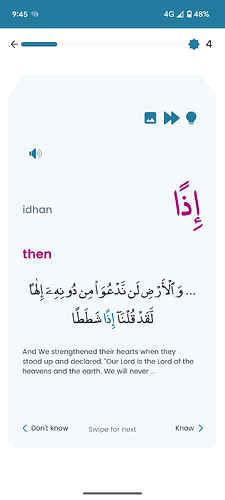Assalaamu Alaikum @a_helmi,
Yes it’s correct. The word “إِذًا” is an adverb used to indicate a consequence or result of something mentioned earlier. It can be translated as “then” or "in that case.
In this verse it introduces a consequence: that if they were to invoke any deity besides Allah (ﷻ) [which is an implied conditional phrase], then they would have certainly spoken an outrageous transgression.
“And We strengthened their hearts when they stood up and said, ‘Our Lord is the Lord of the heavens and the earth. We will never invoke any deity besides Him; [if we did] then we would have certainly spoken an outrageous transgression.’”
I hope this helps!
Assalaamu Alaikum, Raghda
Waalaikumussalam, thank you Raghda, for the wonderful explanation.
You’re very welcome! Alhamdllilah
